
Ahoy, Burgundians! Passport To Pimlico at 75
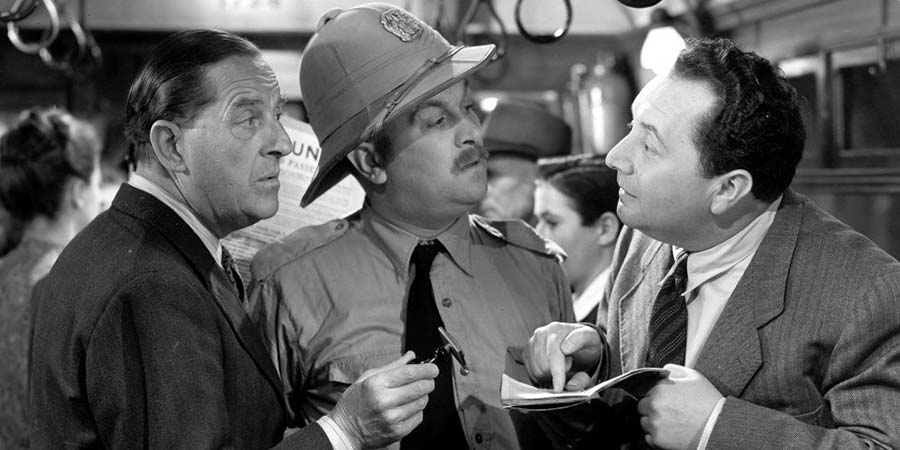
"We always were English, and we'll always be English, and it's just because we are English that we're sticking up for our rights to be Burgundians!"
A line from the classic Ealing comedy film Passport To Pimlico, first released on 28th April 1949.
The Ealing comedies were a series of films made by Ealing Studios between (roughly) 1947 and 1957, including some of the most famous British comedy films of the last century, such as The Lavender Hill Mob (1951), The Titfield Thunderbolt (1953) and The Ladykillers (1955). These films were only a small part of Ealing Studios' output but they are the films it is most famous for, and Passport To Pimlico (1949) is another entry in this body of great work.
The film is a snapshot of post-war London. Filmed in 1949, it was set two years earlier with a background of scruffy kids exploring bomb sites, finding bits of shrapnel and playing soldiers. Food and clothing were still rationed and there a strong community spirit remained, with neighbours chatting and families pulling together in adversity. London was tired, bombed out and needed re-building. Indeed one of the main themes in the film is a community project to build a play area and lido on an old bomb site to give the local children somewhere to go and something to do.
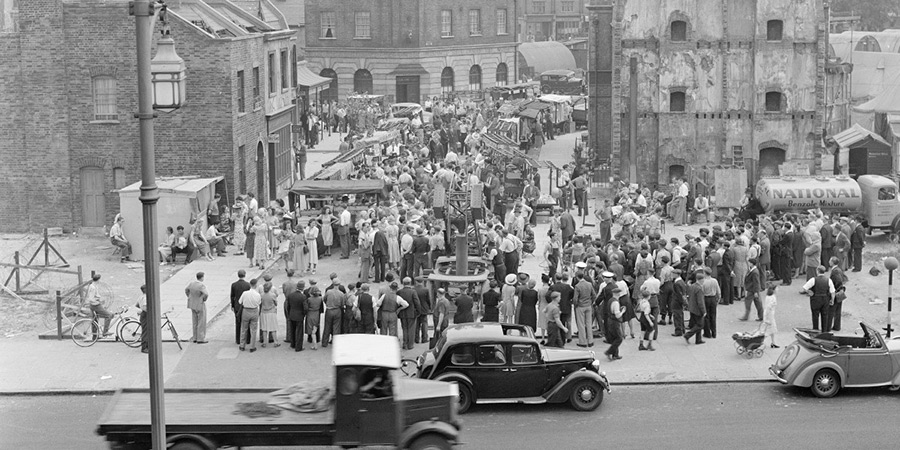
The exterior scenes were actually shot in Lambeth in mid-1948, just a few miles away and over the Thames from Pimlico, with location filming plagued by weather problems. The summer of 1947 had seen a heatwave, but the following year proved to be an extremely wet summer, causing production to be over time and over budget. They tried to shoot as much as possible before 9am to take advantage of good light and dry conditions before rain set in for the day, but the result was a fraught atmosphere on set and regular clashes between the director, Henry Cornelius, and the producer, Michael Balcon. Cornelius had previously worked as an associate producer and screenwriter on two other Ealing films, Hue And Cry and It Always Rains On Sunday (both 1947) but made his directorial debut with Passport To Pimlico - such an unhappy experience he left Ealing Studios shortly afterwards.
The story revolves around a close-knit community who have an unexploded Second World War bomb in their street awaiting disposal. Larking about with an old wheel, a group of local children accidentally detonate the device. Local shopkeeper Arthur Pemberton - played by stalwart of British comedy films of the period, Stanley Holloway - falls into the resultant crater and thinks he sees something interesting. Returning later with his daughter Shirley (Barbara Murray), they discover a cache of hidden treasures including gold coins and valuable artefacts. Along with these is an ancient document declaring the local area, Pimlico, is part of the long-lost Duchy of Burgundy. Professor Hatton-Jones, played by the wonderfully eccentric Margaret Rutherford, confirms the authenticity of the find, and Pimlico soon declares itself an independent state.
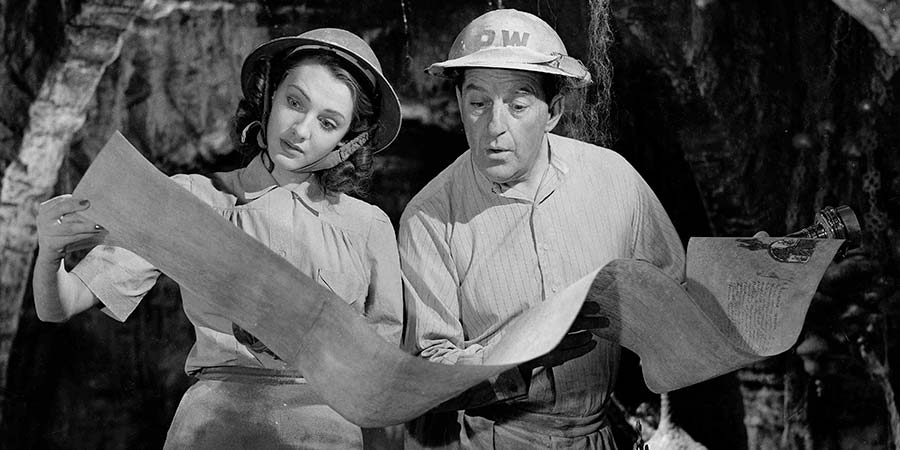
What comes next is a bureaucratic and diplomatic whirlwind as Pimlico's newfound sovereignty means the residents revel in freedom. The shops and bank trade on a Sunday, the pub stays open late and everyone rips up their identity cards and ration books. But it's also chaos as 'Burgundian Pimlico' becomes a lawless society, full of hawkers and illegal traders. Some of the residents delight in the chaotic melee, such as Mr Wix the bank manager (Raymond Huntley), who sees the economic advantages to independence, dress shop owner Edie Randall (Hermione Baddeley), and spiv Fred Cowan (Sydney Tafler), who are after the chance to make a quick quid; whilst other residents fear they'll be 'murdered in their beds' and, all the while, the starched-collared bureaucrats from Whitehall are reluctant, to say the least, to recognise Pimlico's sovereignty.
The answer to Pimlico's prayers comes in the form of Sébastien de Charolais, a descendant of the Duke of Burgundy, played by Paul Dupuis. His documents are verified by an excitable Professor Hatton-Jones and with his blessing the residents form an official committee to try to negotiate with the British government. At the heart of the diplomatic complexities is whether to fight for their independence or reconcile with Whitehall whilst holding on to their right to the treasure.
When passport and customs border controls are set up by the British, however, the situation gets further out of hand. The residents retaliate by stopping a Tube train passing underneath their new-found independent state, and imposing checks and controls of their own. In reality, the London Underground system didn't pass beneath Pimlico at that time (the Victoria line, which now does, was still in planning), but we'll pass over this as artistic licence; it does make for some of the funniest scenes in the film.
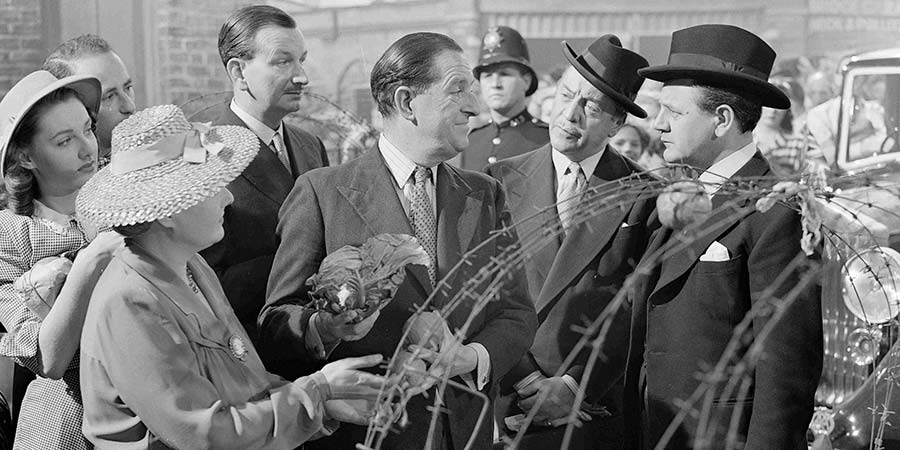
Whitehall soon sees no alternative but to close the border completely, and with a heatwave underway and water and electricity cut off, supplies start to run out. But the press attention means the British people rally to the Burgundians' cause, throwing food packages over the newly constructed barbed wire fences. Gifts arrive from all over London, including pigs being airlifted over the border, and milk being syphoned from a helicopter hovering overhead. It's this sense of anarchy and the locals thumbing of their noses at bureaucracy that gives the film some of its irreverent humour and innate Britishness.
The original idea for the screenplay, written by T.E.B. Clarke, came from a true story during the Second World War. After the German invasion of Holland, the Dutch Royal family were evacuated to the UK, but when that became too dangerous, Princess Juliana of the Netherlands and her children went on to Canada. Princess Juliana was pregnant and due to give birth at the Ottawa Civic Hospital, so the maternity ward was temporarily declared extraterritorial by the Canadian government, meaning the baby was born on Dutch land and would therefore not lose her right to the throne.
In terms of casting, two of the major parts were not intended for the actors who actually went on to play them. The role of the pivotal figure, Arthur Pemberton (Stanley Holloway), who becomes Pimlico's Prime Minister, was first offered to Jack Warner, but he was committed to a different film so turned it down. Professor Hatton-Jones, meanwhile, was meant for Alastair Sim, who also turned down the part.
Other notable characters are John Slater as fishmonger Frank Huggins and his assistant Molly, played by Jane Hylton, who, along with Shirley Pemberton (Barbara Murray), form a sweet subplot of unrequited love. Actor Philip Stainton as PC Spiller provides probably the most famous line in the film: when learning the news they are now part of Burgundy declares 'Blimey, I'm a foreigner!'. There's also a part for a very young Charles Hawtrey, minus his later trademark glasses, as barhand and piano player Bert Finch.
For a film that's considered a quintessential light British post-war comedy, there are actually several satirical themes running through it.
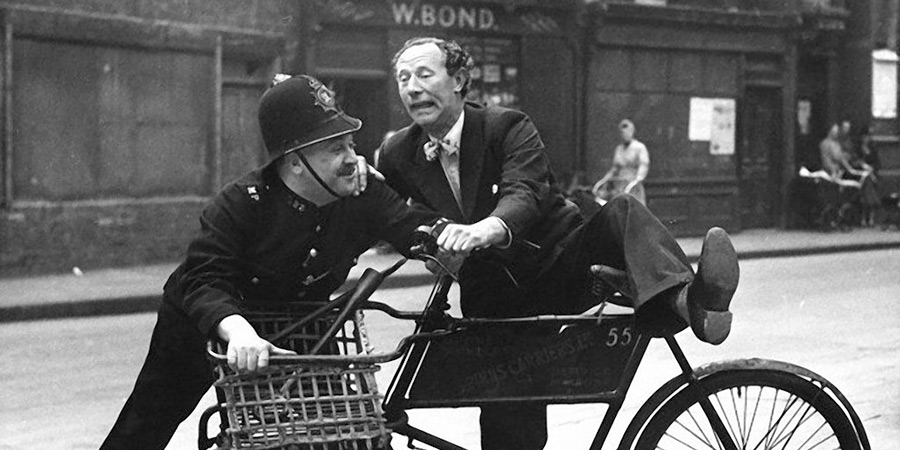
Yes, there's the camaraderie and community spirit that echoes the war, with the neighbours banding together: a plucky band of people pitting themselves against authority, but there's also a good deal of anarchy. This isn't just from the 'Burgundians' but from the wider British public. As soon as they hear about the situation they rush to take advantage of it and make some money. They also rush to defy the siege and pass food to our trapped heroes, cocking a snook at the police and civil service officials alike. Is this a glimpse of what was to come as Britain moved into the 1950s and 60s, and the kind of liberation no one could have dreamt about before the war? It certainly seems to be a reaction to the hardships the conflict had brought about.
Greed is a major theme in the film, and one that isn't often talked about. The reason the people of Pimlico decide to hold out against the British government is they want to hold on to the treasure: there's a childish feel of 'finders keepers' about them all. However, in the end, the money goes to good use and is ploughed back into the community, so they're not as mercenary as we are perhaps initially led to believe. There's also a sense of freedom, pushing against the restraints of the war. The way they gleefully tear up their ration books in a tipsy display of rebellion makes them all giddy with excitement.
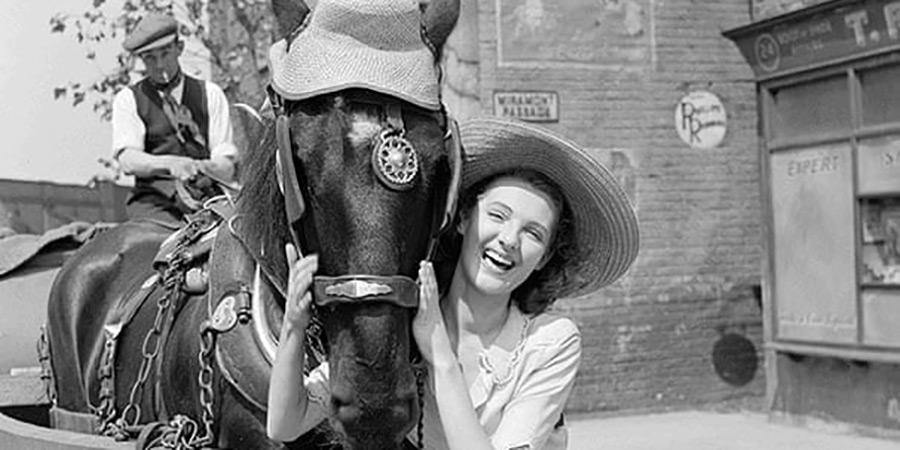
For a film rooted in anarchy, the absurdity of bureaucracy and rebellion, there's a strong theme of equality, especially with the female characters. There's never a feeling that they are being ignored or dismissed in any way. Maybe this comes from the part that women played during the war and the beginnings of sexual equality, coming from the huge contribution they made on the home front. After all, Arthur takes his daughter Shirley, not a male friend or neighbour, down into the bomb crater to search for the treasure in the first place.
When mum Connie tells her daughter off for what she's wearing when she answers the door, Shirley is unconcerned with what anyone thinks, and we see a flash of the new order of things that will come as the 40s turn to the 50s. Connie Pemberton, Arthur's wife, played by Betty Warren, is similarly an incredibly strong character. You feel she and Arthur are equal partners, both in the shop and in their marriage, and it's Connie who suggests they steal the water from the hydrant just 'over the border'. It's also notable that the professor is a woman. Although not originally intended as so, the fact that the character with the academic credentials to unlock the mysteries of both the treasure and the unrepealed charter is female, and looked upon with respect is, frankly, refreshing.
There's the continuous theme of the oppressive heat too, which makes Pimlico feel like a foreign country - a holiday destination almost, and at the end when the heat breaks to good old British rain, the whole episode could be considered a dream: which begs the question, did it all even really happen?
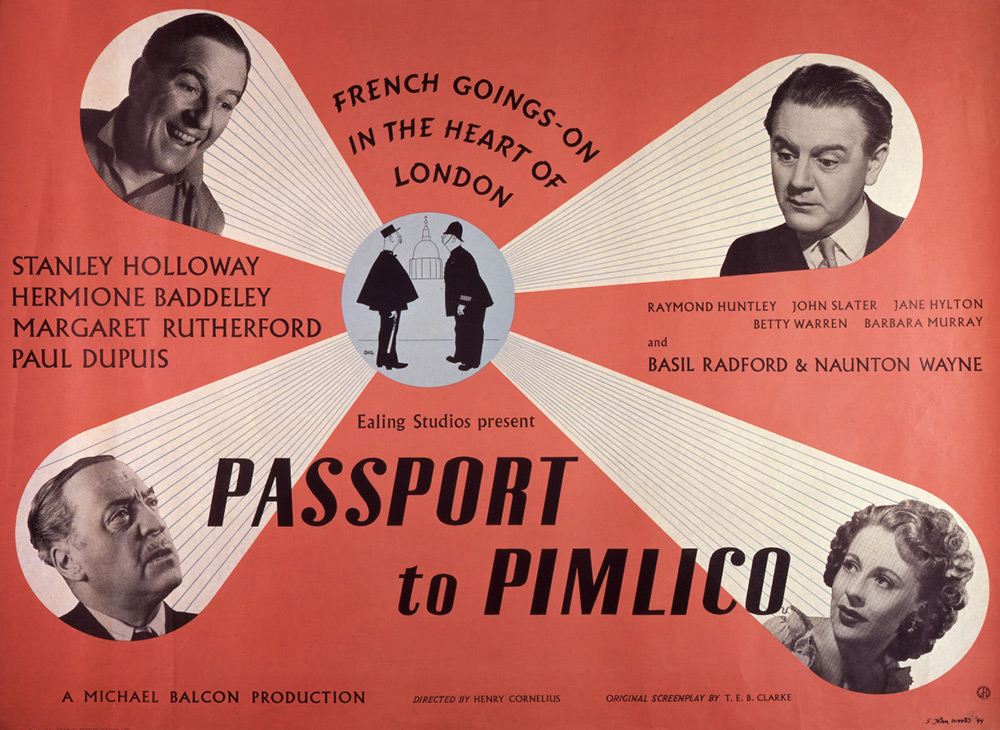
The film was a box office and critical success, securing nominations for both a British Academy Film Award for Best British Film, and an Academy Award for Best Writing (Story and Screenplay). It has been studied by countless historians and critics since, especially with its place amongst the Ealing comedies, and as a British film comedy more generally.
Author Robert Sellers in his 2015 book The Secret Life Of Ealing Studios: Britain's Favourite Film Studio, notes the film "captures the most quintessential English traits of individualism, tolerance and compromise".
Passport To Pimlico's legacy is that it is part of a canon of British comedy films that captured the mood of the nation in those post-war years, celebrating the resilience of ordinary people in the face of adversity and finding their way in a country tired of relentless bombing, hardship and austerity. It was filmed simultaneously with Whisky Galore! (1949) and Kind Hearts And Coronets (1949) and will be remembered fondly with these other great Ealing classics as a timeless cinematic masterpiece.
Help us publish more great content by becoming a BCG Supporter. You'll be backing our mission to champion, celebrate and promote British comedy in all its forms: past, present and future.
We understand times are tough, but if you believe in the power of laughter we'd be honoured to have you join us. Advertising doesn't cover our costs, so every single donation matters and is put to good use. Thank you.
Love comedy? Find out morePassport To Pimlico - Digitally Restored

An archaic document found at a bomb site reveals that the London's Pimlico has for centuries technically been part of France. The local residents embrace their new found continental status, seeing it as a way to avoid the drabness, austerity and rationing of post-war England. The authorities do not, however, share their enthusiasm...
A whimsical and charming British film, Passport To Pimlico is one of the finest examples of the classic Ealing comedies.
First released: Monday 11th June 2012
- Distributor: Optimum Home Entertainment
- Region: B
- Discs: 1
- Minutes: 84
- Subtitles: English
- Catalogue: OPTBD2446
![]() Buy and sell old and new items
Buy and sell old and new items
Search for this product on eBay
BCG may earn commission on sales generated through the links above.
- Distributor: Optimum Home Entertainment
- Region: 2
- Discs: 1
- Minutes: 80
- Catalogue: OPTD2446
![]() Buy and sell old and new items
Buy and sell old and new items
Search for this product on eBay
BCG may earn commission on sales generated through the links above.
- Released: Tuesday 5th April 2005
- Distributor: Anchor Bay Home Entertainment
- Region: 1
- Discs: 1
![]() Buy and sell old and new items
Buy and sell old and new items
Search for this product on eBay
BCG may earn commission on sales generated through the links above.
The Secret Life Of Ealing Studios

A behind-the-scenes account of life at Ealing Studios - one of the great cinematic success stories of post-war Britain, and a byword for a particular strain of comic filmmaking that continues to inspire imitators over half a century on.
This is the first full narrative history of the studio, focusing on its output in the 1940s and '50s, when the movies made there were in astonishing (and revealing) synchronicity with the national mood. Told through the memories of the people who worked and performed there, The Secret Life Of Ealing Studios explores how a small group of maverick filmmakers, some of Britain's most fondly remembered movie stars, and a lot of unsung backroom boys and girls created pictures that presented a unique and enduring view of British identity, and which have since become classics.
Particular emphasis is placed on the filming of Hue & Cry (1947), Passport To Pimlico (1949), Kind Hearts And Coronets (1949), Whisky Galore (1949), The Lavender Hill Mob (1951), The Man In The White Suit (1951) and The Ladykillers (1955), along with war films such as The Cruel Sea (1953).
At the heart of the story is the figure of Michael Balcon - perhaps the closest Britain has ever come to producing a movie mogul in the Hollywood mould - and iconic actors such as Peter Sellers, Alec Guinness, Margaret Rutherford and Sid James.
First published: Thursday 15th October 2015
- Published: Monday 5th December 2022
- Publisher: Dean Street Press
- Pages: 354
- Catalogue: 9781915393500
![]() Buy and sell old and new items
Buy and sell old and new items
Search for this product on eBay
BCG may earn commission on sales generated through the links above.
- Published: Monday 5th December 2022
- Publisher: Dean Street Press
- Download: 1.13mb
BCG may earn commission on sales generated through the links above.
- Publisher: Aurum Press
- Pages: 352
- Catalogue: 9781781313978
![]() Buy and sell old and new items
Buy and sell old and new items
Search for this product on eBay
BCG may earn commission on sales generated through the links above.

